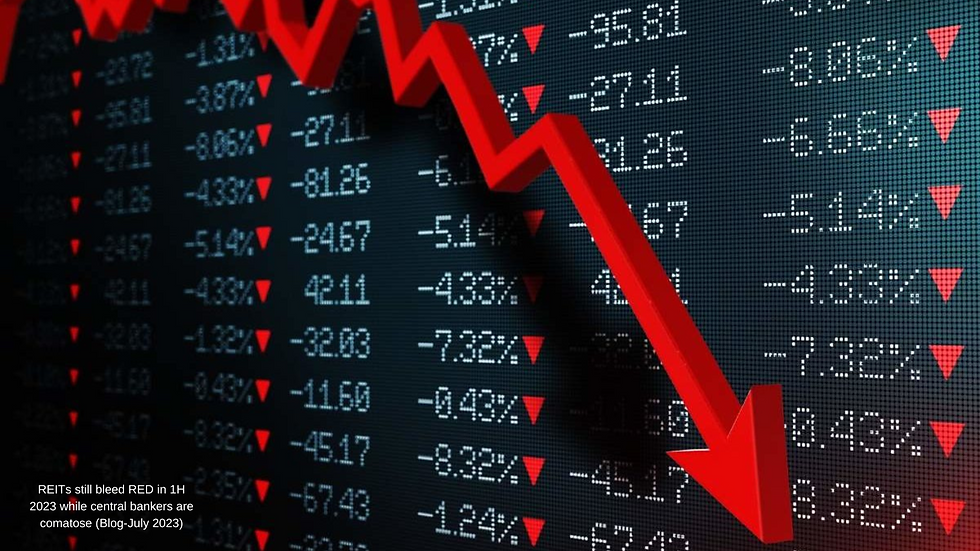INVESTING IN BORING AND PROFITABLE COMPANIES IN THE PAST 20 YEARS
- by Gabriel Yap

- Nov 18, 2017
- 4 min read
05/2014-
The Jardine group celebrated its 20th year of listing in Singapore recently. When it left its home base Hongkong, the Jardines were termed as “Hong gone”, a reference to the Chinese trading houses listed on the Hongkong bourses. It was one of the groups that helped shaped Hong Kong given its involvement in the Opium War a century ago.

20 years ago, upon relisting in Singapore, the Jardine group of companies went through a painful 5 – 8 year of share price wilderness as many institutional investors had dumped their stocks as they viewed its move as “gone with the wind” as Jardine stand to lose out on China’s rise. They were fearful that the Jardine would lose (and it did lose) its weights in the Hang Seng Index. Also, upon listing in Singapore, many investors, through lack of understanding or good analysis, find the Jardines a “big bore”.
But for me, it was the best time to shift through the shaft and picked some of the best companies at the best share prices then. This episode has ingrained in me what Warren Buffet has been expounding “Be greedy when others are fearful” and may I add “when others are bored and lacking in good analysis”.
“Gone with the wind” or “Hong gone”,the great thing about investing in the Jardine group is that it continued to grow, albeit at growth rates that are not terribly exciting. Today, the conglomerate has businesses worth $62 billion in revenues, more than doubling every decade.
Today, Jardine Matheson (JM), Jardine Strategic (JS) and Jardine C&C together make up 17% of Singapore’s FTSTI. It also has Dairy Farm which run supermarkets and pharmacies, Hongkong Land who is still the largest landlord in Hongkong’s central business district and Mandarin Oriental which own hotel chains, listed in Singapore. Astra International which is listed in Jakarta is the country’s largest listed company.
What I love about Jardine 20 years ago was their low profile and steady and consistent profit growth. This has enabled them to take a long-term view of businesses, very much Warren Buffet style. This has allowed its growth to exemplify to their shares prices – over the last decade, JM and JS share prices have soared tremendously – JM jumped from US$9.85 to US$53.08 while JS rose from US$4.70 to US$35.86 respectively as at end-March 2014.

It certainly helped that Jardine continued to be controlled by a single family – the Keswick family, the descendents of Scottish founders William Jardine and James Matheson since 1832.
Although the Jardine group make up 17% of FTSTI, their trading volumes constitute about 1% of FTSTI. In line with their low profile is the thicket of cross-holdings that companies within the group enjoy. JM is the head company while JS serves as the defence in the group’s takeover-proofed structured, designed after a near-successful raid from Hong Kong Superman Li Ka-shing in the 1980s.
The 2 companies hold majority stakes in each other and between them, control the other companies.
Jardine is also unique for its reticence to corporate governance norms, contrary to Singapore Stock Exchange aspirations for strong corporate governance for its listed companies.
Its 14-member board of directors include 5 family members with zero independent directors and just 4 non-executives.
The current star within the group is Astra International – not only is Astra a good proxy to the booming Indonsian consumer story, it is also one of the fast growing companies in Asia with interests in cars, motorbike, banking, toll roads, taxis and palm oil.
Astra is a good example of how Jardine runs its business – it first acquired a 31% stake in Astra in 2000 and slowly but surely increased its stake to 50.1% presently. Astra has more than 190,000 employess in 170 companies, but there is only a few Jardine executives within the management minimizing expatriate cost and culture clashes. Noteably, most of these few Jardine executives are in the finance divisions which report back to head office the key operating metrics on a timely basis while keeping a low profile. Not surprisingly, Astra has also performed very well in the past decade.
This year does look exciting for “boring” Jardine group – they bought a 25% stake in China’s Zhongsheng group which distribute cars for $731 million. It would not surprise me that in time to come, it will increase its stake, if the business pans out, to a controlling stake.
When it was announced that Temasek Holdings will pay HK$44 Billion (US$5.7 Billion) for a 25% stake in competitor AS Watson owned by Hutchson Whampoa, in-turn own by Superman Li, I could not help but wonder how much the Wellcome chain of supermarkets and Mannings chain of phamacies within DF would be worth. Afterall, Wellecome, Mannings together with Watsons dominate Hongkong retail with a 40% market share.

While DF share price has already gone from US$1.89 to US$9.74 as at end-March 2014, I believe that it is likely to continue to trudge along higher as its organic growth across market segments are likely to lead to higher divendends for shareholders, with or without, a sovereign wealth fund stake.
Investing in the Jardine group of companies profitably in the past 20 years is like rigorous fundamental analysis of its Profit & Loss, Balance Sheet and Cashflow statements. Good analysis produce good margin of safety for investments and re-investments while keeping a risk low profile. Only traders will find them “boring” and unprofitable.
I continue to love this aspect of my life.




Comments